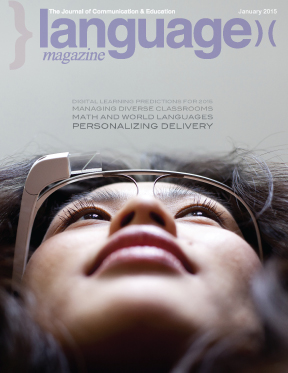A School Full of Wise Guides
The widely-held belief that technology would completely revolutionize all levels of education has become tempered recently largely because we have expected too much of digital devices. Computers can’t do the learning for us, nor can they do the teaching for us, but they can do a very good job helping us do both better, quicker, in a more individualized way, and more in-depth. Recognizing this is of particular importance to educators concerned with literacy and language as the acquisition of communication skills is such a personal process during which technology has the potential to play such an important role.
Twenty years ago, an article by Alison King in the journal College Teaching entitled “From Sage on the Stage to Guide on the Side” sparked an ongoing debate on the role of teachers and education reform in general between the constructivist (guide) camp and the tradtionalist (sage) camp. Despite the disagreement, most educators agree that they have to be both a sage and a guide depending on the circumstances.
We seem to be going through a similar process with educational technology in which the initial expectation by many EdTech advocates was that as long as the hardware, software, and connectivity were there, learning would just happen. We are now recognizing that educational technology is not in itself the solution but an important part of a complex equation of social, economic, and personal issues that influence educational outcomes. Maybe the debate today should be whether or not students would be better served if technology were regarded as the “guide on the side” rather than the “sage on the stage.”
Right now, over 3.5 million college students are taking online courses or earning online college degrees, and over 700,000 high school students are taking at least one course online. One of the enduring misconceptions about online learning is that it can replace the teacher, or at least diminish the role of the teacher. There are some online courses without teachers, but they are generally supplementary while most of the core online programs use teachers in a role that is central to learning.
The student-centered approach to teaching, which is currently receiving a great deal of attention, is based on the constructivist model in which students construct rather than receive or assimilate knowledge. This model is particularly suited to the interactive nature of digital learning.
“Constructivist learning models require active input from students and requires intellectual effort and aids retention. The role of the teacher in student-centered learning is to facilitate the students’ learning by providing a framework (i.e. activities for students to complete) that facilitates their learning. For example, the teacher posts activities or questions that students complete. Projects include: writing papers, essays, and reports, publishing Web pages, conducting research, answering open-ended questions, creating artwork, and organizing events,” explains Roxanne Star Hiltz (The Virtual Classroom: Learning Without Limits via Computer Networks, Intellect Books, 1994).
Teachers have to leverage technology so that students can build their own knowledge through activities that engage them in active learning. Effective learning happens when students take stock of what they already know and then move beyond it. Technology is now revealing its virtually limitless potential to act as the guide on the side of the teacher and student. We should embrace this role before demanding more.
IN THIS ISSUE:
Digital Guide on the Side
Tanya Roscorla predicts the digital trends that will continue to grow in K–12 education in 2015 as learning becomes more student centered
Managing Diversity
Anne Scatchell argues that administrators need specific training to successfully manage culturally diverse classrooms
Making Reading Your Own
Todd Brekhus, president of myON, extols the benefits of students developing their own personal digital libraries
Speaking by Numbers
Martha Edelson and Lori Langer de Ramirez share the consequences of motivation and affect in teaching Middle School World Language and Math
Last Writes Richard Lederer blossoms forth in the new year



